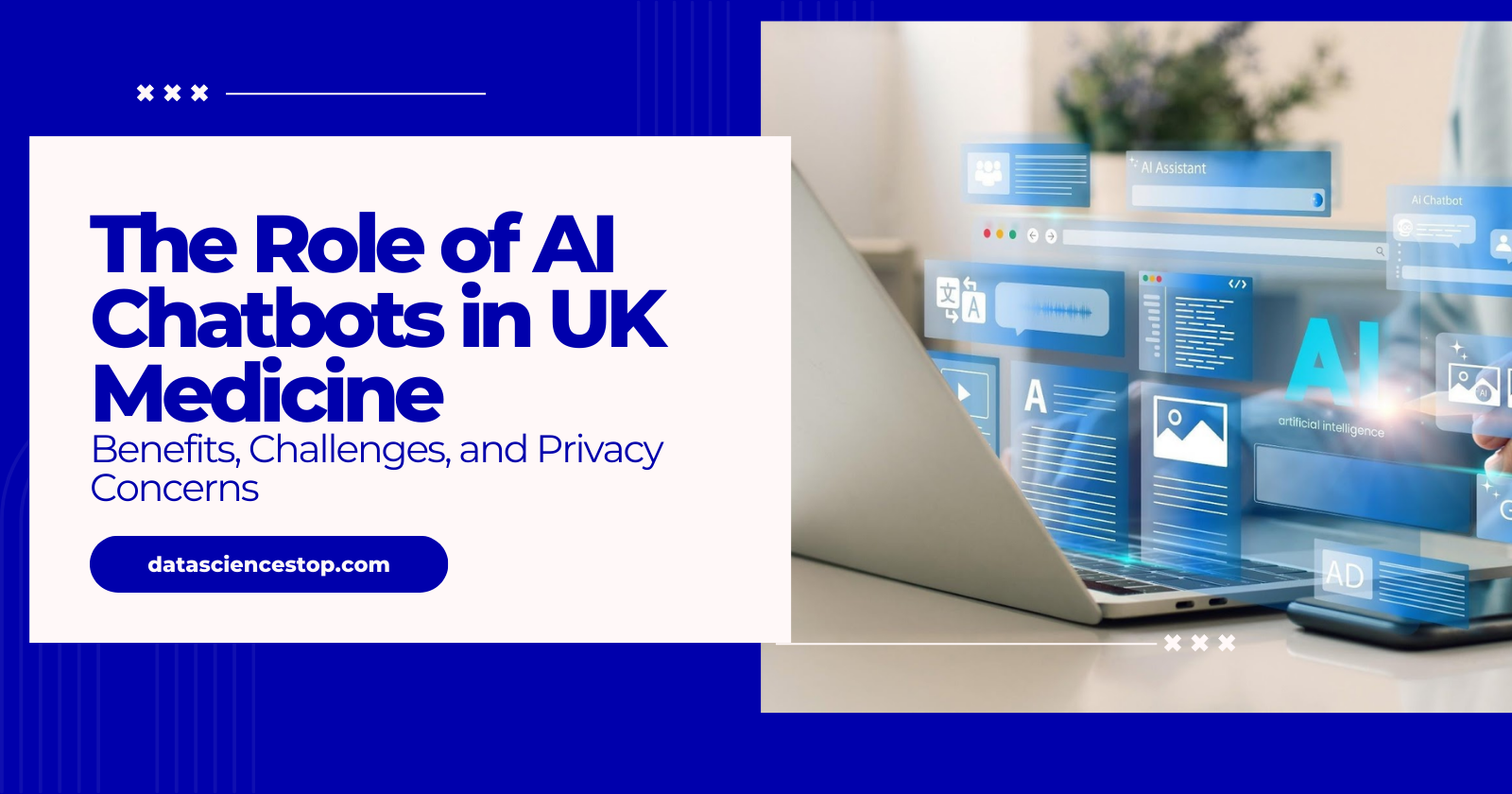The Role of AI Chatbots in UK Medicine: Benefits, Challenges, and Privacy Concerns
 datasciencestop
datasciencestop
The Role of AI Chatbots in UK Medicine: Benefits, Challenges, and Privacy Concerns
A recent study published in the journal BMJ Health and Care Informatics measured the use of generative artificial intelligence (AI) by general practitioners (GPs) in the United Kingdom (UK).
Abstract
Objectives- Interest in using language model after the launch of ChatGpt get increased in general practitioners(GP )
Methods -The study was launched as a monthly ‘omnibus survey’ which has a predetermined sample size of 1000 participants.
Results -53% respondents were men,54% were 46 years or older and 20% of others uses Generative AI for clinical diagnosis
Discussion-GPs may derive value from these tools, particularly with administrative tasks and to support clinical reasoning.
Conclusion -The medical community will need to find ways to both educate physicians and trainees and guide patients about the safe adoption of these tools.
The Impact of AI Chatbots in UK Healthcare
Enhanced efficiency in diagnoses
AI chatbots are used to diagnose the patient's health problem even if it is complex in nature.They can give quick analysis regarding symptoms,histories and assessments.
- Immediate Response
It reduces the trouble in concentrating or making decisions ,solving minor problems and more facilitation in emergency situation
- Real Time Consuming
They act as a time saver by reducing the load in administrative works mainly in complex cases
- Document preparation
Traditional Method | AI-Assisted Method |
Manual Notes | Automated Scripts |
Time consuming | Real time data saver |
Chances of errors | Accurate information |
5.Improve Consistency-They help in streamlined documentation
Methods in using AI Chatbots
“We surveyed GPs registered with the clinician marketing service Doctors.net.uk, the largest professional network for UK doctors currently registered with the General Medical Council,7 with 254 741 members out of a total of approximately 379 208 registered UK doctors (67%).8 The study was launched as a monthly ‘omnibus survey’ which has predetermined sample sizes of 1000 participants and participants are requested to answer all closed-ended questions. “
1.Used in Medical Research and Literature review by scanning vast database and give recent updates
2.By self analysis they can provide suggestions to diagnose
3.Maintaining patient record and give needed information at the time of treatment
4.Their results are efficient and accurate in prediction
Benefits
Faster access to information
Accurate prediction
Enhanced summary report
Challenges
Repetitive text in all summaries
Keeping it updated and maintaining it biassed
Results of using Chatbox
“*Of the 1006 respondents, 531 (53%) respondents were men, 544 (54%) were 46 years or older. Describing their roles, 455 (45%) reported ‘GP Partner/Principal’, 341 (34%) ‘Salaried GP’, 181 (18%) ‘Locum GP’ and 29 (3%) ‘GP Registrar’. In online supplemental appendix 3 we describe how the respondents differ from current UK GPs. 20% (205) reported using generative AI tools in clinical practice; of those who answered affirmatively and were invited to clarify further, 29% (47) reported using these tools to generate documentation after patient appointments and 28% (45) to suggest a differential diagnosis.”*
Risk Factor | Potential Consequence |
Extraction of Data | Profile has no authorisation |
Ads within target | Risk in data breach |
Insurance coverage | Sometime unfair treatment |
No clear data storage | Ownership policies |
Limitations in Access | No potential bias |
Discussion
In February 2024, the largest survey on doctors' use of generative AI in clinical practice was conducted, more than a year after the launch of ChatGPT.1 in 5 UK GPs reported using LLM-powered chatbots (e.g., ChatGPT) for clinical tasks.More than 25% of GPs who used generative AI employed it for tasks such as documentation after patient appointments or differential diagnosis.It is valuable tool for healthcare diagnosis.and helps a lot in decision making .Main challenges lies in subtle errors and recording patient history.
Potential privacy risk includes lack of standards in data handling ,there may be misuse of standard medical norms,it is clear there is third party involvement in patient record.Cyber security needs to be in standard form .
To organise these methods and to help in implementing the same the following need to be considered such that there should be proper ethical norm for AI and regulations in privacy .Always there should be limitations in using AI and for data handling methods.Proper use case are defined for patient healthcare.GDPR compliance are to be considered while using AI.Data Protection Impact Assessments (DPIAs) are regulated.
“Lack of regulatory guidance: The study emphasizes that despite the increasing use of AI tools, there is still a lack of clear policies or guidelines on how these technologies should be integrated into healthcare safely.”
Future of AI in Healthcare
1.Open to AI algorithms
2.Improves Diagnosis
3.High in standardising data
4.More Trainings are organised
5.Ensures more protection of data
Conclusion
Combination of AI chatbots in UK healthcare has created a major impact on diagnosis and documentation processes,helping doctors with vital support in their daily practices. They helping enhanced output and proper cyber security .There may be some crucial factors on confidentiality which can be resolved by some regulatory measures .Healthcare can utilise the chat box for making their work easy but it should be properly monitored and done with proper guidance among doctors and patients
References
1.https://informatics.bmj.com/content/31/1/e101102#sec-9
More Recent News
Subscribe to my newsletter
Read articles from datasciencestop directly inside your inbox. Subscribe to the newsletter, and don't miss out.
Written by
